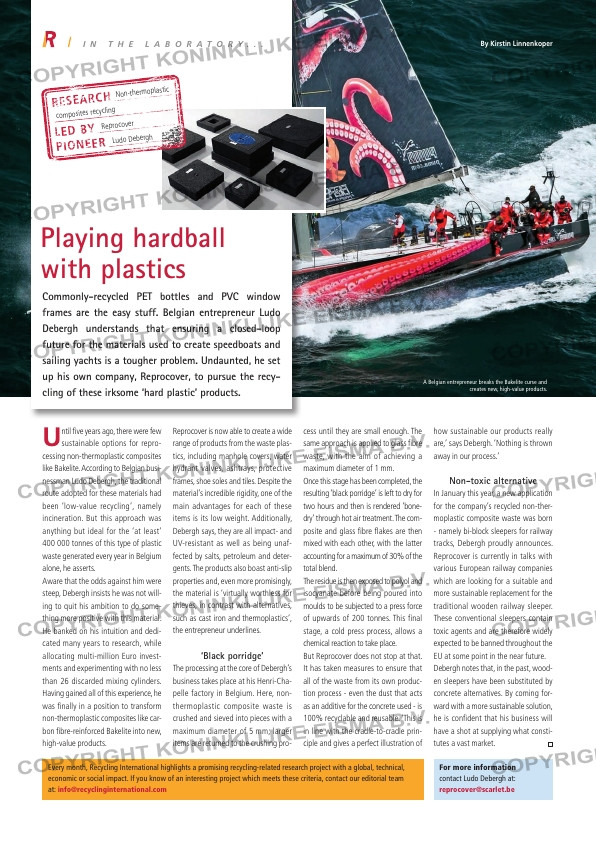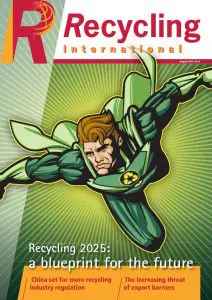Page 79 from: August 2013

I N T H E L A B O R A T O R Y . . .
how sustainable our products really
are,’ says Debergh. ‘Nothing is thrown
away in our process.’
Non-toxic alternative
In January this year, a new application
for the company’s recycled non-ther-
moplastic composite waste was born
– namely bi-block sleepers for railway
tracks, Debergh proudly announces.
Reprocover is currently in talks with
various European railway companies
which are looking for a suitable and
more sustainable replacement for the
traditional wooden railway sleeper.
These conventional sleepers contain
toxic agents and are therefore widely
expected to be banned throughout the
EU at some point in the near future.
Debergh notes that, in the past, wood-
en sleepers have been substituted by
concrete alternatives. By coming for-
ward with a more sustainable solution,
he is confi dent that his business will
have a shot at supplying what consti-
tutes a vast market.
Until fi ve years ago, there were few sustainable options for repro-
cessing non-thermoplastic composites
like Bakelite. According to Belgian busi-
nessman Ludo Debergh, the traditional
route adopted for these materials had
been ‘low-value recycling’, namely
incineration. But this approach was
anything but ideal for the ‘at least’
400 000 tonnes of this type of plastic
waste generated every year in Belgium
alone, he asserts.
Aware that the odds against him were
steep, Debergh insists he was not will-
ing to quit his ambition to do some-
thing more positive with this material.
He banked on his intuition and dedi-
cated many years to research, while
allocating multi-million Euro invest-
ments and experimenting with no less
than 26 discarded mixing cylinders.
Having gained all of this experience, he
was fi nally in a position to transform
non-thermoplastic composites like car-
bon fi bre-reinforced Bakelite into new,
high-value products.
cess until they are small enough. The
same approach is applied to glass fi bre
waste, with the aim of achieving a
maximum diameter of 1 mm.
Once this stage has been completed, the
resulting ‘black porridge’ is left to dry for
two hours and then is rendered ‘bone-
dry’ through hot air treatment. The com-
posite and glass fi bre fl akes are then
mixed with each other, with the latter
accounting for a maximum of 30% of the
total blend.
The residue is then exposed to polyol and
isocyanate before being poured into
moulds to be subjected to a press force
of upwards of 200 tonnes. This final
stage, a cold press process, allows a
chemical reaction to take place.
But Reprocover does not stop at that.
It has taken measures to ensure that
all of the waste from its own produc-
tion process – even the dust that acts
as an additive for the concrete used – is
100% recyclable and reusable. ‘This is
in line with the cradle-to-cradle prin-
ciple and gives a perfect illustration of
Reprocover is now able to create a wide
range of products from the waste plas-
tics, including manhole covers, water
hydrant valves, ashtrays, protective
frames, shoe soles and tiles. Despite the
material’s incredible rigidity, one of the
main advantages for each of these
items is its low weight. Additionally,
Debergh says, they are all impact- and
UV-resistant as well as being unaf-
fected by salts, petroleum and deter-
gents. The products also boast anti-slip
properties and, even more promisingly,
the material is ‘virtually worthless for
thieves, in contrast with alternatives,
such as cast iron and thermoplastics’,
the entrepreneur underlines.
‘Black porridge’
The processing at the core of Debergh’s
business takes place at his Henri-Cha-
pelle factory in Belgium. Here, non-
thermoplastic composite waste is
crushed and sieved into pieces with a
maximum diameter of 5 mm; larger
items are returned to the crushing pro-
Playing hardball
with plastics
Commonly-recycled PET bottles and PVC window
frames are the easy stuff. Belgian entrepreneur Ludo
Debergh understands that ensuring a closed-loop
future for the materials used to create speedboats and
sailing yachts is a tougher problem. Undaunted, he set
up his own company, Reprocover, to pursue the recy-
cling of these irksome ‘hard plastic’ products.
By Kirstin Linnenkoper
Every month, Recycling International highlights a promising recycling-related research project with a global, technical,
economic or social impact. If you know of an interesting project which meets these criteria, contact our editorial team
at: [email protected]
For more information
contact Ludo Debergh at:
[email protected]
A Belgian entrepreneur breaks the Bakelite curse and
creates new, high-value products.
RESEARCH
LED BY
PIONEER
Non-thermopl
astic
Reprocover
Ludo Debergh
composites rec
ycling
RI-6_In the laboratory.indd 79 01-08-13 16:25



